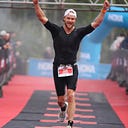6 things that will improve your recovery
Five are essential, one is a bonus
Most people know that recovery is important, but many are unaware of what to do in order to recover properly. As part of human nature, we are looking for shortcuts — the same way we eat fat-burning pills in order to lose weight, instead of focusing on proper nutrition and working out enough. We think that things like massage guns, recovery boots, and compression clothing alone will speed up our recovery. Don’t get me wrong, I use all those things, but they are at the bottom of my list.
Here are 6 things that will improve your recovery.
Build up your fitness
You need to gradually build up your fitness, increasing length/speed/sets/reps/weight over time. This way the body responds well to the training and you won’t overtrain. By doing too much too soon, it will take a long time to recover.
Rest
The most important thing. When you’re lifting weights, the muscles don’t grow as you’re doing the actual lifting — they get broken down. They grow when you’re recovering. So, have recovery days scheduled, and listen to your body. If you feel that your body isn’t 100%, it’s probably better to take the day off and give it some time to recover. Just make sure that you’re not just using that as an excuse to skip a workout because you actually don’t feel like it — there’s a big difference if it’s your body or your mind that’s telling you to rest.
Sleep
Underestimated, yet super important. We’re all different, so the amount of sleep we should get varies — but mostly recommended is to strive for 7–8 hours. However, the quality is more important than the actual length.
Nutrition
I’m no expert when it comes to nutrition, but I know that these things have worked for me:
- Having a base knowledge about macros. Knowing how they are calculated, the macro-breakdown of different foods (and the mindset to look at the nutrition labels), knowing how much protein/carbs/fat I should get, etc.
- Focusing on eating “good food”, and eliminating processed foods as much as possible.
- Eliminating as much sugar as possible.
- Including salads, berries, seeds, etc.
Recovery workouts
Another underestimated method is doing a recovery workout. If you run a marathon, one of the best things you can do to recover is to go for a short easy run* the next day. Most people avoid doing it, because why would you want to go run when you just ran a marathon? I sure avoided it for a long time. The mistakes we make are usually running too fast or too long. It should be short and easy. The idea is just to get the blood flowing, which speeds up the recovery.
*Obviously, it doesn’t have to be a recovery run. It can be anything that gets the blood flowing, like a bike ride or a swim workout.
Stretching & mobility
Exercising creates toxins in the body as muscles are exerted. By stretching the muscles after exercise, these toxins move into the bloodstream and out of the muscles, where they can be broken down and eradicated. By stretching and doing mobility exercises, you’re also able to do the required movements better or more efficiently — so the risk of injury by doing exercises “the wrong way” is reduced. I don’t get massages regularly, but I guess they could be added in here as well.
Bonus: all the fancy tools
There are a ton of different tools you can use, my go-to's for running and triathlon training are: massage gun, recovery boots, foam roller, and a lacrosse ball. I use the massage gun before(to warm up) and after(to recover) every run. The recovery boots 1–2 times during the weekend after my big workouts. The lacrosse ball mainly before runs to massage the bottom of my feet.
However, these tools are just add-ons. They wouldn’t do much if I skipped the five other things I listed above, but after doing all the other things “right” — these tools can give a small boost. My point is, that if you’re not sleeping enough or getting the right nutrition, a massage gun will not help you recover. Focus on the other things first.
Yes, there are more things you can do. I personally do ice baths and sauna, they do speed up my recovery. The reason I didn’t list them above is because I’ve read some studies saying it is good and some studies saying it is bad for recovery. It depends on the type of sport, how close to the excercise, etc. So I left them out, just to not make any false statements.
Then there are obviously more sport-specific things you can do, but these 6 things are a good foundation.
